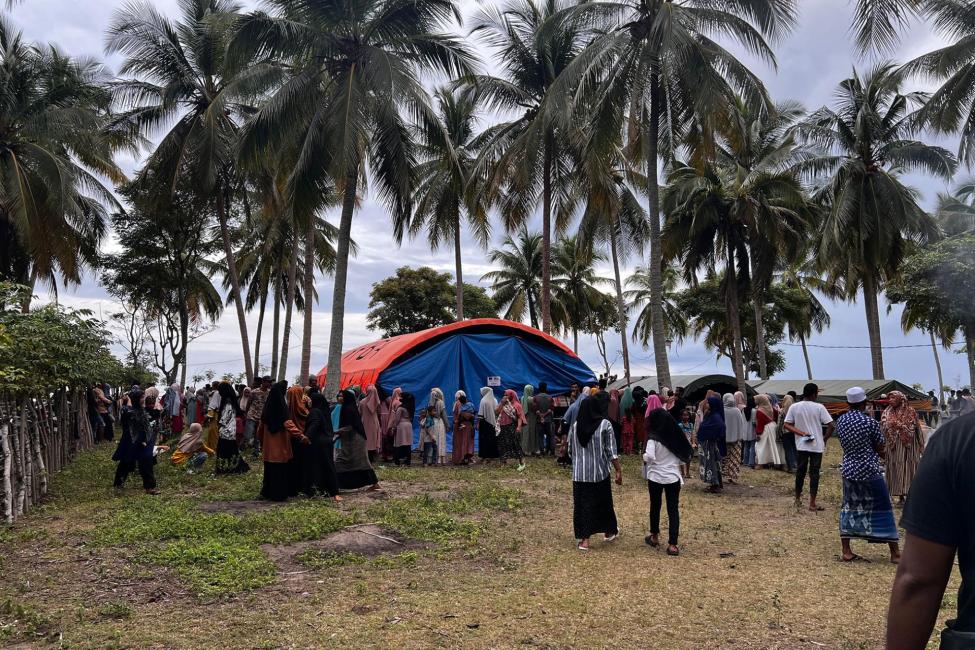-
Who we are
WHO WE AREThe International Organization for Migration (IOM) is part of the United Nations System as the leading inter-governmental organization promoting since 1951 humane and orderly migration for the benefit of all, with 175 member states and a presence in over 100 countries. IOM joined the United Nations system in September 2016.
About
About
IOM Global
IOM Global
-
Our Work
Our WorkAs the leading inter-governmental organization promoting humane and orderly migration, IOM plays a key role to support the achievement of the 2030 Agenda through different areas of intervention that connect both humanitarian assistance and sustainable development.
Cross-cutting (Global)
Cross-cutting (Global)
- Data and Resources
- Take Action
- 2030 Agenda
Ambitious, Concrete Action Needed to Avoid the Worst Climate Impacts: IOM
New York – The International Organization for Migration (IOM) is calling for concrete action to prevent, avert and minimize the risks of climate disasters ahead of the High-Level Meeting of the Midterm Review of the Sendai Framework in New York on 18-19 May.
Climate change is reshaping migration patterns around the world. Disasters are the leading cause of internal displacements. Last year, 32.6 million new internal displacements were caused by disasters (IDMC, Global Report on Internal Displacement 2023). As the frequency, duration and intensity of natural hazards worsens in the context of climate change, the number of climate disasters is expected to rise considerably.
The United Nations Office for Disaster Risk Reduction’s (UNDRR) Global Assessment Report on Disaster Risk Reduction predicts that by 2030, 560 disasters will take place annually – more than 1.5 disasters per day. The report warns of a 30 per cent increase in droughts and a tripling in the number of extreme temperature events with dire effects on the most vulnerable countries to the impacts of climate change.
“Given the scale of the climate emergency facing the world, investing in early warning and disaster risk management systems, and mitigation and adaptation programming for those who will have no choice but to leave is an investment for the future,” stated IOM Deputy Director General for Operations, Ugochi Daniels.
“Ambitious and concerted leadership by States is required to protect communities from the worst impacts of climate change through adaptation and resilience building measures.”
IOM is currently implementing over 200 Risk Reduction and Climate Change Adaptation-related projects in some of the world’s worst humanitarian emergencies including Sudan, Türkiye, Pakistan, Ethiopia, Afghanistan, Bangladesh, the Democratic Republic of the Congo, Somalia, Mozambique, South Sudan and Nigeria.
To save lives and prevent avoidable losses and damage caused by disasters, IOM is partnering with UNDRR, the World Meteorological Organization, the International Telecommunications Union and the International Federation of the Red Cross to implement the Early Warnings for All initiative launched at COP27 in Egypt last year.
IOM calls on all governments and parties to move from climate risk to climate resilient development in order to address disaster risk in the face of climate change. IOM is committed to translating the mobility dimensions of reducing disaster risk into concrete actions to ensure the safety and protection of migrants and displaced persons everywhere. Pathways for safe, orderly and regular migration are a critical part for sustainable solutions.
The Global Compact for Safe, Orderly and Regular Migration (GCM) contains several intergovernmental commitments relating to migration in the context of climate change, aimed at minimizing the adverse drivers that compel people to move and at enhancing the availability of pathways for regular migration.
IOM’s institutional approach to disaster displacement and climate-induced human mobility includes programming on preparedness, response, and solutions.
More information on IOM’s engagement within the Sendai Midterm Review can be found here.
***
For more information, please contact:
Migration, Environment, Climate Change, and Risk Reduction Division, mecrHQ@iom.int
Chloé Lavau, IOM Communications Officer for Climate Change and Migration, clavau@iom.int

